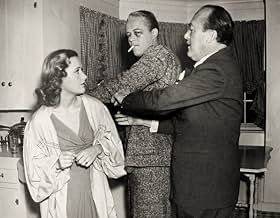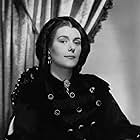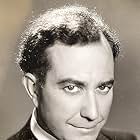I expect actor Morris was hired for the lead for commercial purposes. After all, his brawny frame sure doesn't look like a weakling, but then old Hollywood doesn't put nerds in leading roles. His Ted is supposed to be a mama's boy despite the unlikely looks. Upper class Mom (O'Neill) rears him to be forgiving in everything and to always lose gracefully without trying hard to win. I guess it's an extreme form of "noblesse oblige" as practiced by the refined upper crust. Looks like the idea is that since you're already at the societal top, you've got nothing to prove.
Trouble is this overly generous attitude causes problems for Ted as an adult, particularly with his love life where he doesn't try hard to win Barbara (Lane) despite how he feels. What he needs to do in so many words is 'to stand up for what you want'. So the idea, I believe, is a critique of being both overly generous as a personality trait and of the kind of upper class superiority that patronizes others.
I'm not surprised this was a Warner Bros. production since they were the blue-collar studio of the 30's. (In that regard, catch the revealing very last line.) The plot's a worthy one, but is none too plausibly conveyed among the many principals. At the same time, too much of the movie is too crowded with speaking parts and over-written as a result. Plus, Ted's rather violent turn-around sends a dubious message that's unfortunately papered over by a typical Hollywood ending. Lane over-emotes as the lively ingénue but at least provides spark, while Morris smiles affably while mainly standing around, that is, when not throwing a big tennis match. Hard to believe from this that he was a highly decorated WWII pilot before passing away at an early age.
Anyway, the movie handles tricky material rather awkwardly and without generating much audience involvement. Too bad.
























